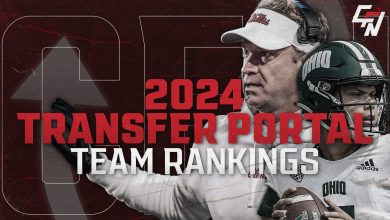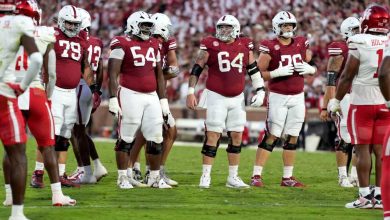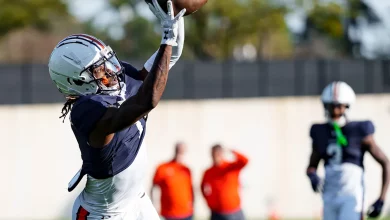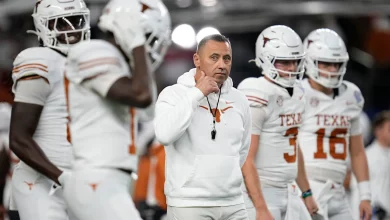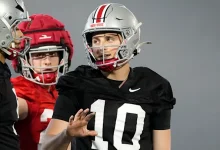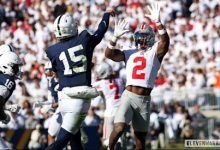Case Keenum mentored C.J. Stroud for two years and now brings that experience mentoring Caleb Williams as the Chicago Bears’ veteran quarterback mentor.

In the high-stakes, pressure-packed world of NFL quarterbacking, experience and mentorship can be game changers. Few players understand this better than Case Keenum, whose journey as a trusted veteran quarterback mentor has become a vital part of several teams’ developmental strategies. After spending two impactful years mentoring Houston Texans’ young quarterback C.J. Stroud, Keenum has now stepped into a similar role with the Chicago Bears, where he is guiding the franchise’s prized rookie Caleb Williams.
This transition not only highlights Keenum’s reputation as a steadying influence but also underscores the Bears’ commitment to developing Williams into a franchise leader. As Caleb Williams embarks on his NFL career, having Case Keenum in his corner offers a blend of knowledge, patience, and real-world wisdom that can help smooth the often turbulent rookie journey.
Case Keenum’s Unique Path to Mentorship
Case Keenum’s NFL career is defined by perseverance, adaptability, and leadership. Undrafted in 2012, Keenum fought his way onto NFL rosters and carved out a niche as a reliable journeyman quarterback. His professional journey included stops with numerous teams, including the Houston Texans, Washington Commanders, and Denver Broncos, among others.
However, what sets Keenum apart is not just his on-field experience but his ability to embrace the role of mentor to younger quarterbacks. His time with the Houston Texans, particularly mentoring C.J. Stroud, cemented his reputation as a quarterback who could blend his playing responsibilities with guiding a young, talented signal-caller.
This mentorship role requires more than technical knowledge; it demands patience, emotional intelligence, and a selfless approach to leadership—qualities Keenum has displayed throughout his career.
Mentoring C.J. Stroud: A Two-Year Journey
When C.J. Stroud entered the NFL as a highly touted rookie quarterback, the Texans recognized the importance of surrounding him with experienced veterans. Case Keenum, with his vast knowledge and calm demeanor, was an ideal mentor.
Over two seasons, Keenum worked closely with Stroud, offering guidance on everything from reading defenses and refining mechanics to handling the mental pressures of leading an NFL offense. Their relationship was built on trust and open communication, with Keenum serving as both a sounding board and a teacher.
Stroud benefited from Keenum’s insights into NFL defenses, game preparation, and managing the day-to-day grind of professional football. Beyond the X’s and O’s, Keenum helped Stroud develop the confidence and resilience needed to thrive under the spotlight.
For Keenum, this mentorship role was deeply fulfilling, allowing him to extend his impact beyond his personal stats and contribute to the growth of the next generation.
Bringing Experience to Chicago: Mentoring Caleb Williams
Now, with the Chicago Bears, Keenum is applying those same principles in mentoring rookie quarterback Caleb Williams. Williams, a dynamic and highly skilled quarterback, arrived in Chicago with tremendous expectations. The Bears are banking on his talent to lead a resurgent offense, and Keenum’s presence aims to facilitate a smoother transition.
Williams’ playing style differs somewhat from Stroud’s, with greater emphasis on mobility and improvisation. Keenum’s mentorship is tailored to these strengths while ensuring Williams builds a solid foundation in traditional quarterback fundamentals.
The veteran’s role involves daily communication, film study sessions, practice advice, and emotional support. Keenum helps Williams process the fast-paced NFL environment, balancing performance pressures with continuous improvement.
The Importance of Veteran Mentors in the NFL
Case Keenum’s evolving role reflects a broader trend in the NFL: the value of veteran mentors in quarterback development. Modern NFL offenses are complex, and rookies often face steep learning curves. Veteran mentors provide context, translate complicated concepts into digestible lessons, and model professional behavior.
Mentorship accelerates learning, reduces rookie mistakes, and can foster leadership qualities essential for quarterback success. Players like Keenum, who embrace this role, become invaluable assets for teams aiming to maximize young quarterbacks’ potential.
For the Bears, leveraging Keenum’s mentorship experience demonstrates strategic foresight. It’s an investment not only in Caleb Williams’ immediate development but also in building a culture of growth and resilience.
Building a Brotherhood: Chemistry Between Keenum and Williams
Successful mentorship extends beyond technical coaching—it requires building a relationship grounded in trust and respect. Keenum and Williams have quickly developed a strong rapport, creating an environment where Williams feels comfortable asking questions, sharing concerns, and receiving candid feedback.
This brotherhood fosters a learning mindset essential for the rookie’s adaptation. Keenum’s calm presence provides stability amid the highs and lows of a rookie NFL season. Their relationship also exemplifies the mentorship model the Bears hope will permeate the entire team.
Challenges and Opportunities in the Mentor-Mentee Dynamic
While mentorship offers immense benefits, it also comes with challenges. Balancing the mentor’s own playing role with guiding a rookie demands time management and emotional energy. Additionally, adapting mentorship style to fit the individual needs of a quarterback requires flexibility.
Case Keenum’s experience mentoring C.J. Stroud prepared him well for these challenges. His success lies in his ability to listen, adapt, and lead by example. With Caleb Williams, Keenum continues to refine these skills, ensuring the mentorship is both effective and supportive.
Looking Ahead: Impact on the Bears’ Future
The presence of Case Keenum mentoring Caleb Williams signals the Chicago Bears’ commitment to long-term quarterback development. While Williams has immense talent, the NFL’s rigors mean success depends on continuous learning and adjustment.
Keenum’s mentorship can help Williams navigate rookie mistakes, build confidence, and understand the nuances of NFL defenses and game management. This partnership also allows the Bears to protect Williams’ development curve, giving him a stable support system during inevitable growing pains.
For the Bears organization, investing in this mentorship model can pay dividends in building a competitive, resilient team led by a quarterback ready to thrive in the league.
A Veteran’s Role in Shaping the Next Generation
Case Keenum’s journey from mentoring C.J. Stroud to guiding Caleb Williams underscores the critical role veteran players can play in NFL quarterback development. His ability to combine experience, leadership, and emotional intelligence makes him an invaluable asset for teams focused on cultivating young talent.
As Caleb Williams embarks on his professional career with the Chicago Bears, having Keenum’s steady mentorship offers a pathway to growth, confidence, and success. This partnership embodies the spirit of teamwork and learning that defines championship-caliber organizations.
For Bears fans and football observers alike, watching this mentor-mentee relationship evolve will be one of the most compelling storylines of the upcoming NFL season.



